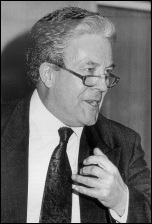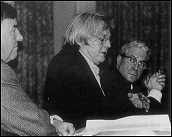Roy Lockett leaves the stage

|
Roy's contribution to the union and the industry has been recognised at every level. Chris Smith, UK Secretary of State for Culture, Media and Sport, says: "Roy has provided a long and valuable service to ACTT, BECTU and the world of film and television. He has also served on my department's Film Policy Review Group and the Film Action Committee and has made a significant contribution over many years. I am grateful to him for everything he has done and wish him a long and happy retirement. Thank you Roy."
Roy started out as an apprentice compositor and he recalled the time when he was at Oxford working as a comp at the Croydon Times - "the Manchester Guardian of South London" - during a vacation. Problems arose during its merger with "that other tabloid giant, the Croydon Advertiser". Within six weeks of being hired, Roy became acting FOC (shop steward), won a victory for the members and got himself sacked for his trouble.
Roy joined the staff of the union in 1965 as research officer and Editor of the magazine, then known as Film & Television Technician. George Elvin was General Secretary, "the man who built the ACTT from a handful of left-wing technicians and laboratory workers." There were many stories about George, and Roy's favourite was from 1968, when Associated Rediffusion lost the London franchise. "Jack O'Connor - another legendary character - rushed into George's office and said: 'George, George, Associated Rediffusion are out". George looked up and said "Give 'em support, but no strike pay for the first month!"
In the early seventies, he researched and he was a key member of the union team which renegotiated the feature agreement which had been effectively unchanged since the late 40s. "We won overtime for the higher grades and brought an annual cost of living bonus which paid handsomely in the fierce inflation of those days. That was a real win."
As Editor of the union journal, Roy enjoyed doing interviews: "Robert Bolt on the future of the union and the film industry, Jeremy lsaacs on the industrial implications of Channel 4 and memorably Alan Parker who railed against the pointy heads at the BFI. He's chairman of the BFI now!
"The old Soho Square column was a delight. Prominent members of the industry writing anonymously: Gus Macdonald, David Elstein, BS Johnson. Some wonderful angry polemics. They still read well today."
Roy became Deputy General Secretary of ACTT in the mid-eighties. He recalls the ferocious attacks on the unions in the Thatcher years. "For ACTT there was the long agony of TV-am, when the rottweiler tendency smashed through derecognition. When we were demonised by the tabloid press as the media conglomerates forged their abuse into the public mind - and feathered their own nests - when it seemed at times we would become the sweatshop of Europe."

|
| Roy Lockett with Alan Parker defending directors' rights in 1998 |
BECTU Vice-President Tudor Gates observes: "Throughout his career Roy has been a peacemaker. When casualisation of film and television took hold there was a lot of distrust of freelances on the part of the permanently employed workers. Roy managed to talk to both sides and bridge the two cultures in the union."
He added: "But Roy has also been prepared to speak out on a point of principle, even when it could have made him unpopular to do so. He spoke out for a return to work in the TV-am strike when doing so went well against the grain."
Tudor recalls that of the many initiatives Roy undertook, a couple stand out: he pushed for the franchised workshops to be established, and it was his initiative to set up JOBFIT - the joint board for film industry training, now known as FT2. Frank McGettigan, director and general manager of Channel 4, comments: "Roy has made an immense contribution to the industry; his help in the creation of FT2 and Skillset was invaluable. We shall miss his contribution to the Skillset board."
Roy played a major part in bringing together BETA and ACTT, and he believes that unity is where BECTU's strength will lie. "I believe that coming together with the NUJ could be the key to the future, perhaps also with the Directors Guild.
"Unions are about members, but they are also about the people who work for them. The clerks, the post room, the secretaries, the research officers, journal editors, the organisers and officials, whose endurance, hard graft and commitment turn aspirations into reality, policy into practice. They have earned respect. They are a key part of the dynamo which drives our movement. Underestimate them, underrate them, underpay them and the only people to benefit are the employers.
"It has been a privilege and a delight to work for the union," he says. "It has given me a sense of purpose and it has given me hundreds of good friends among our officials and members. People like [finance officer] George Maniatakis - tight on expenses but brimming over with human warmth - Andy Egan, Janice Turner, Annie Dawson, my closest friends. I can fairly say I owe everything to the union, and I'm not just talking about my unpaid expenses."
Research officer Andy Egan says: "Roy will be greatly missed in BECTU. In his long career he has been the very best kind of trade union official - he has never become cynical, never lost his enthusiasm for the labour movement; never lost his intellectual excitement in being involved in the debates on the future of the film and TV industry."

|
| Roy Lockett addresses the 1999 BECTU Conference |
Both Andy and Roy are jazz fans: "I reckon the only thing he'd rather have done would have been to play jazz in late '40s New York along with his heroes like Lester Young, Charlie Parker, Miles Davis and Gerry Mulligan." He added: "He will always have my deepest sympathy for his eccentric but tenacious support for Crystal Palace FC."
The final word goes to Lord Puttnam: "I've known Roy for over 25 years. Throughout that time he has never been anything other than a tireless, passionate and absolutely committed champion of the British film and television industries, most particularly in the crucial field of training. Anyone who knows Roy can testify to the extraordinary energy and enthusiasm which he brings to everything he does - in ways that are both inspiring and infectious. I wish Roy a very happy retirement, one that's richly deserved - he'll be greatly missed."
